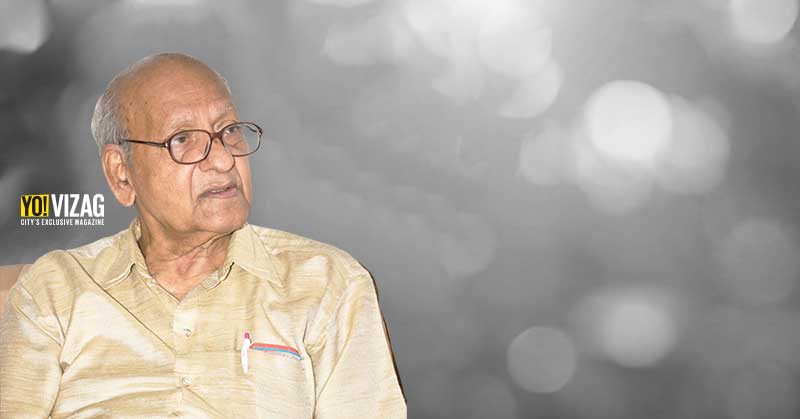

The Envinornmentalist
On the advisory board for many institutions, the name synonymous with environmentalism, a man known for his firm stance against environmental pollution and ecological destruction, a capable civil engineer who worked in the prestigious Nagarjuna Sagar project and a distinguished professor who even headed the Civil Engineering department and the College of Engineering of Andhra University, Professor T Shivaji Rao almost did not want to become an engineer. “I did not plan to study engineering, I was always interested in arts, languages and literature; but a friend prevailed on me to attempt engineering. Even after filling out the application form for admission into engineering, I had second thoughts especially when I heard that even the exit gates of the engineering college reminded all graduates ‘do not forget your 10%’ referring to the blatant corruption in the engineering field.” Aghast at the thought of so much corruption, young Shivaji Rao threw the application form into the canal near his home town Pamarru. But fate had other plans for him; some stranger retrieved that application and thoughtfully posted it. Subsequently, when he received the acceptance card from B.D.T. Engineering College, Davanagere, he was convinced that there was some divine hand involved.
Prof. T Shivaji Rao was born in Mudinepalli, near Gudivada, Krishna Dist Andhra Pradesh. His initial schooling was mainly in the surrounding villages – Bommuluru, Angaluru, Pedamaddali, Pamarru, Machilipatnam and Vijayawada. He received Bachelor’s degree in Civil Engineering from Viswesariah Engineering College, Bangalore (1956). Fresh out of college, he was employed at the Nagarjuna Sagar Dam project. Two years into the project, as a junior engineer, when he was also incharge of the Stores, he faced a hurdle. A Superintendent’s wife requisitioned curtains for her home and was furious when Shivaji Rao asked for a receipt of the curtains he had arranged for. When she started creating problems for him because he persisted on procuring a receipt from her, he opted to leave and keep a distance from such corruption. Here the octogenarian adds “I truly believe that marriages are made in heaven, as my wife totally supported my decision and stood by me against corruption throughout!” He then decided to shift to the education field, when his father-in-law convinced him to join the Andhra University. While teaching there, inspired by his fellow teachers, he decided to pursue higher studies abroad and subsequently applied for a scholarship to the Rice University. After picking up a Masters Degree in Environmental Sciences and Engineering from Rice University, Houston, Texas, (1962), he returned to AU.
The professor strongly believes that education is the key to life, “it expands your thinking and creativity” he says. But he also adds that education today does not teach moral values and ethics, which are very important. He stresses that it is vital that students are taught ethics and moral values at a young age so that it remains ingrained in them for life. He laments that generally Indians lack a sense of belonging to their nation. He has been an active anti-pollution activist since 1970. He worked hard and stopped the setting up of a nuclear plant near the Nagarjuna Sagar Dam in 1988. Resolutely against nuclear plants, he equates them to the gas-chambers of Hitler’s regime. “A nuclear plant is like creating a gas-camber which spreads poisonous effluents over the country” says the environmentalist. He further adds, that “unless you understand all the different phases of nature, you cannot get a comprehensive view of nature; and understanding nature is vital for all growth and sustainable development”
Today, the former Head of the Department of Civil Engineering, former principal of College of Engineering, Andhra University, Fellow of the A.P. Academy of Sciences, and Fellow of the Institution of Engineers (India), Professor T Shivaji Rao is still active as the Director, Centre for Environmental Studies, Gitam University and as the Chairman, Environmental Monitoring Committee, Visakhapatnam Port Trust. And that’s not all; he started the Masters Degree Programme in Environmental Engineering in 1963 at Andhra University. He has taught courses in epidemiology, parasitology, environmental sanitation, sanitary chemistry, micro-biology, radiological health, industrial hygiene, hydrology and hydraulics, advanced water supply and sewage treatment, industrial waste treatment, stream sanitation, air pollution control, environmental impact analysis etc. and guided the thesis work of 50 Masters and 5 Doctoral students. He published books and several papers on environmental subjects. In addition, he formerly served as UGC Emeritus professor, Honorary Professor Andhra University, Honorary Professor Nagarjuna University, Consulting Professor, Manonmanian Sundarnar University and as a Honorary Professor, Jawaharlal Nehru Technological University.
He is a recipient of Best Teacher State Award of Government of Andhra Pradesh for 1986-87, the University Grants Commissions National Award Swami Pranavananda Award on Ecology and Environmental Sciences for the year 1991, and Sivananda Eminent Citizen Award for 2002 by Sanathana Dharma Charitable Trust, Andhra Pradesh state. He was Invited by the Royal Swedish Academy of Sciences for Participation in Nobel symposium in August 1976 and by the Travel Agents Association of India to Khatmandu, Nepal to present a paper on The Threat to Taj Mahal due to Air Pollution from Mathura Refinery (1979), and by the International Baccalaureate Asia-Pacific to Khatmandu, Nepal as key note speaker to present a paper on Sustainable Development and Environment.
As a member of various Government boards pertaining to pollution and environmental studies, he interacted extensively with state Chief Ministers and even Prime Ministers specifically, Smt. Indira Gandhi, Sri A. B. Vajpayee. He is a member of the A.P. Sate Pollution Control Board, and Chairman of its Technical Committee of the Pollution Control Board. He was also member of Environmental Education Committee (UGC) and Chairman of Andhra Pradesh State Committee on ecological survey of Kolleru Lake. He was also the Honorary Environmental Advisor for Visakhapatnam Municipal Corporation and the Expert member of Environmental Appraisal Committees for Industries and River valley Projects, Ministry of Environment & Forests, Government of India, Member of the Expert Committees on Artificial Rains, Government of A.P., Member, High Power Committee on Seismic Safety of Tehri Dam, Government of India, Member, expert Committee on Environmental Impact of Telugu Ganga Project, Founder Member of Indian Council for Enviro-Legal Action, New Delhi, Member Board of trustees of MC Mehta Environment Foundation, New Delhi. .
With such an impressive list of accomplishments, the professor is pleasantly simple and totally down to earth. The socially committed professor is still strongly voicing his protest against nuclear power plants especially following the innumerable risks to the environs around raised by the recent earthquake in Japan. Even today, he is widely respected for his anti-corruption attitude and his deep commitment to preserving and safeguarding the world at least as we know it for future generations.
This article was first published in print on May’2012 – Yo! Vizag Magazine
This post was last modified on 11/08/2016 3:21 pm
Karate Kid: Legends, the sixth instalment in the Karate Kid franchise, has hit theatres and…
The weekend has officially begun! With the start of a fresh Friday evening comes the…
Most people know they should save for retirement. But when it comes to how much,…
Vizag-origin filmmaker, Sagi Sree Hari Varma, will start a remarkable journey to Italy to participate…
An elderly 64-year-old man from HB Colony in Visakhapatnam passed away shortly after testing positive…
Yoga training sessions are being conducted by the district administration at the ward secretariats in…
Leave a Comment